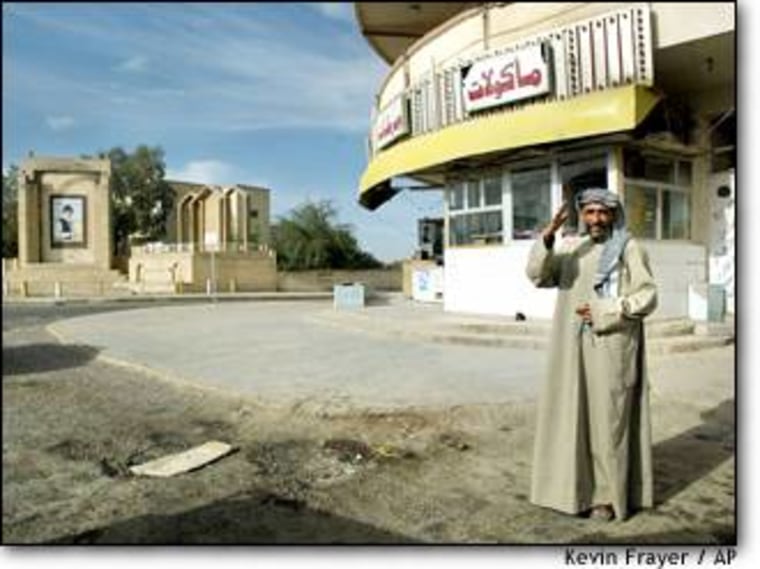The flag of Saddam Hussein’s regime was still flying in the Iraqi dictator’s birthplace on Sunday. Elaborate mosaic portraits of Saddam crafted onto building facades, pavilions and freestanding edifices remained untouched. A bronze statue with Saddam’s likeness atop a rearing horse dominated Tikrit’s central square. If the Iraqi leader has fallen, residents of this museum to the cult of Saddam are afraid to admit it.
Perched on the Tigris River, Saddam’s imposing limestone palace was empty on Sunday. The few residents of Tikrit who ventured onto the streets said they hadn’t seen the president in years. When asked if Saddam’s reign was over, few offered a definitive “yes.”
Pressed to explain why Saddam’s statues and murals remained intact, Tikrit’s residents demurred.
“Ask the chief,” said Mohammed Arif, referring to the tribal leaders of the al-Tikriti clan — Saddam’s family, which has dominated the city since he rose to power three decades ago. The al-Tikriti chief was nowhere to be found. The al-Tikritis apparently fled the city on Saturday after negotiating a “surrender” to the Americans.
But to the best of anyone’s knowledge here, none of the al-Tikritis had turned themselves in. “They just left,” said one resident, who refused to give his name. The U.S. Central Command in the Persian Gulf state of Qatar said Sunday that American troops were in Tikrit. None, however, appeared to have reached the city center.
The only signs downtown of the U.S. military were two gaping holes in a bridge over the Tigris, the target of American airstrikes. American helicopter gunships circled over a site about three miles south of Tikrit, where smoke billowed into the sunset from an apparent U.S. air attack.
Locals said one target of American bombing — which thundered uninterrupted for several hours early Sunday — was the city’s university. They said they heard tank fire from Iraqi troops at the same time. The city then went quiet, and its residents began to emerge from their homes.
QUIET COLLAPSE
The unsettled calm in Tikrit on Sunday was accented by only a few tentative thumbs up signs to journalists passing through the city. There was no cheering and no one scaling monuments to Saddam with their fists raised in the air — scenes played out in other Iraqi cities as they fell from Saddam’s grasp.
At the entrance to Tikrit, a handful of residents took up arms to prevent paramilitaries loyal to the Iraqi leader, called “Saddam’s Fedayeen,” from returning to the city. The black-clad Fedayeen fighters were among the most loyal to Saddam. Residents said they packed up and left on Sunday morning.
“We are good,” the vigilante said. “You are welcome,” he said, clutching an AK-47 machine gun. “But the Fedayeen are not.”
Residents said the Fedayeen and Iraqi troops around Tikrit changed into civilian clothes as American troops approached the city. Young men were seen driving out of town throughout the morning. In a light pickup truck driven by a pair of Iraqi men along the route leading to Tikrit, a gas mask and fatigues were found, suggesting a connection to Saddam’s forces.
SADDAM’S CITY
For a small town on the Tigris River, and compared to other Iraqi cities, Tikrit was lavishly looked after. Neatly planned neighborhoods on the river are more than most Iraqis can afford, but Saddam doled out land — and jobs — to loyal family members. The gate of Tikrit governor’s mansion has more than a passing resemblance to Versailles. Bronze galloping horses anchor its 70-foot high cornices.
Tikrit’s main bazaar looks like it belongs on a movie set. Elegant archways lead to each store. Everything in Tikrit, it appears, was made for Saddam’s pleasure.
Still, residents were reluctant to discuss the Iraqi leader, whose whereabouts are unknown. With the Americans just south of town, and expected to secure the city center shortly, a few said they would not oppose the U.S. military — if it provided security.
“We will welcome them,” said 30-year-old Safa Abdul Aza. “But we need stability.” Aza said residents were wary that looters ransacking other Iraqi cities would make their way to Tikrit.
(MSNBC.com’s Preston Mendenhall is on assignment in Iraq.)
